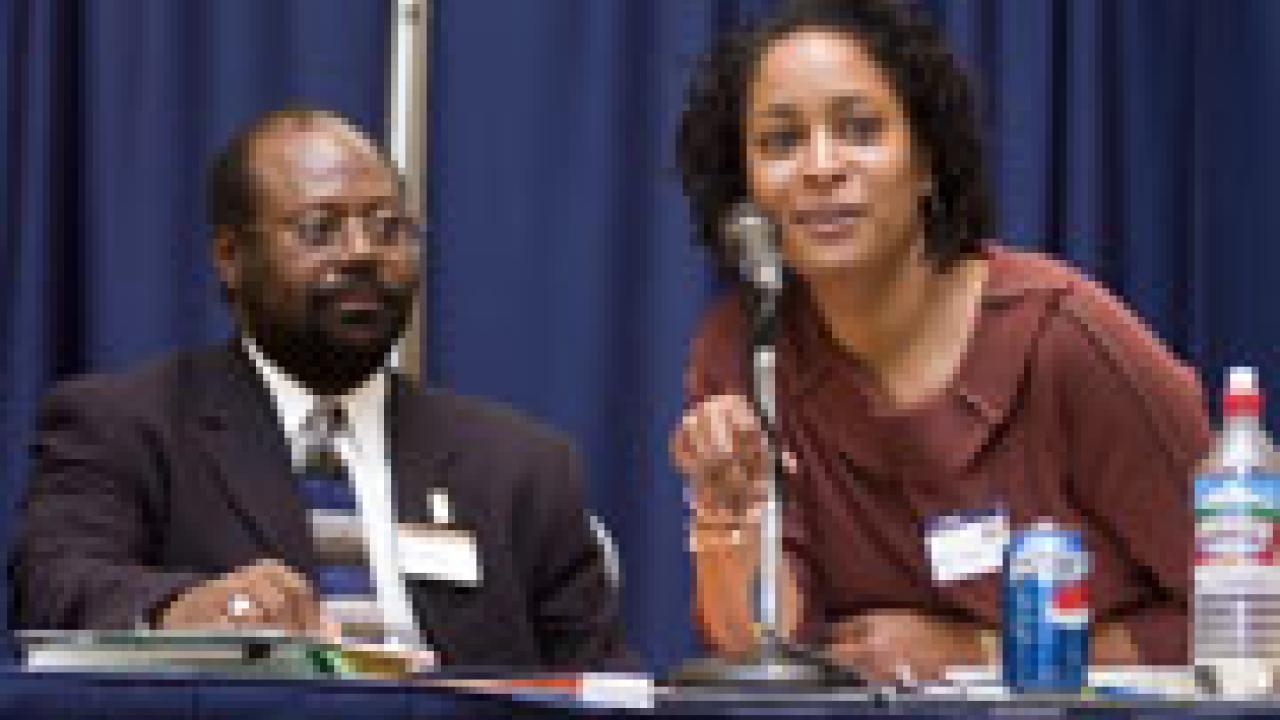A recent campus forum on racial profiling and other community-police concerns is expected to improve the process for filing complaints on such matters.
More than 150 students, staff, police, faculty and community members gathered Nov. 21 at the Activities and Recreation Center for a three-hour discussion on city and campus police treatment of minorities. The forum was prompted in part by an informal survey released earlier this year that painted a bleak picture of race relations on campus and in the city of Davis.
Racial profiling is defined as any law enforcement action based on an individual's race or ethnicity rather than behavior. Campus and city police were adamant that profiling does not occur. At the same time, though, they were open to closer scrutiny of the issue and ferreting out any problems.
UC Davis Police Chief Annette Spicuzza told the audience that she will not "tolerate" racial profiling in her department. Even so, she acknowledged, there seems to be "a lack of trust" in the campus community that the police will do the right thing. (See "Police Respond to Racial Profiling Charges," page 2.)
Partly in response to such concerns, Spicuzza said her office is speeding up the complaint process. Now, the police will review complaints within 30 days instead of the current one year timetable. She also wants the police to provide more timely updates to those submitting the complaints and to make it easier to file complaints online.
"That type of affirmation is encouraging," said Donald Moore, a student judicial affairs officer and one of those involved in the survey.
Spicuzza pointed out that no formal charges have been filed against campus police on racial profiling. As a result, there is a "responsibility to put it back on the community," Spicuzza noted. "If you have an issue, you have to make a complaint. If we don't hear that something may not be right in the department, then we can't fix it."
Spicuzza also said that police will undergo additional diversity training, and one officer will be assigned exclusively to monitor racial profiling charges.
She added that the UC Davis Police Department is offering for the first time a Citizens' Academy. The nine-week-long class is open to students, staff and anybody in the community who wants to learn more about the police department and how it operates.
Spicuzza said the academy will offer insights into the work of police officers. The class is free to the public and will cover a variety of police tactics used in law enforcement, including community and police relations, defensive tactics, high-speed chases, arrests, search and seizure and a shoot-don't-shoot scenario. Taught at the police department on Kleiber Hall Drive, academy classes will begin Jan. 11and run every Wednesday from 3 to 5 p.m. until March 8.
"I'm here to listen to you," Spicuzza told the crowd on Nov. 21, noting that she has been in her job only six months. "I take this very seriously, based on what I read in the survey. I hear the pain, the anger in it."
The survey of 364 people, conducted in May by a group calling itself "concerned campus affiliates," portrayed a campus where students of color — those of African-American, Latin, Asian Pacific Islander and Middle Eastern origins — feel "mistrusted, unsafe and unwelcome." Many report far more negative encounters with police than do white students.
Moore said the historical problem in this issue has been "a lack of data." Now, he said, the survey will provide some of that. "This issue keeps coming up. We need to correct it."
The survey — which was not a UC Davis-authorized document — also proposed other recommendations that remain under discussion. They include a policy to require the police to collect racial and ethnic data on all stops and all contacts; a formal, universitywide survey to explore racial profiling; and a campus task force to monitor the issue.
Rahim Reed, the associate executive vice chancellor for Campus Community Relations, said though the report was "not a scientific survey," it could serve as a vehicle to "move forward on meaningful change."
Mandeep Dhaliwal, a fourth-year student, said she came to the forum because of concerns about racial profiling. "A lot of my male friends have had unnecessary trouble. Students need to be active in a process like this."
Others expressed frustration. "There's a lot of talk on this," said Babajide Olupona, an African-American undergraduate who said the police have pulled him over 13 times only to give him one ticket. "These things need to stop."
Moore acknowledged the difficulty police face when approaching the occupants of a vehicle just pulled over. California Highway Patrol officer Andy Stevens was gunned down Nov. 17 while making a vehicle stop outside Woodland.
"These are tense situations for the police," said Moore. "Every time they walk up to a car, they have these concerns."
Davis Police Chief Jim Hyde presented data that he said shows his department does not engage in racial profiling. He also said the city police force is emphasizing diversity when recruiting and training its officers, and has set up a review process for complaints.
"The job of being a police officer in California is highly regulated. We are not running around doing crazy things," said Hyde, adding that for every police officer killed in the line of duty, three commit suicide.
As a result, he added, departments such as Davis have extensive psychological resources for officers to draw upon if a need arises.
Media Resources
Clifton B. Parker, Dateline, (530) 752-1932, cparker@ucdavis.edu
